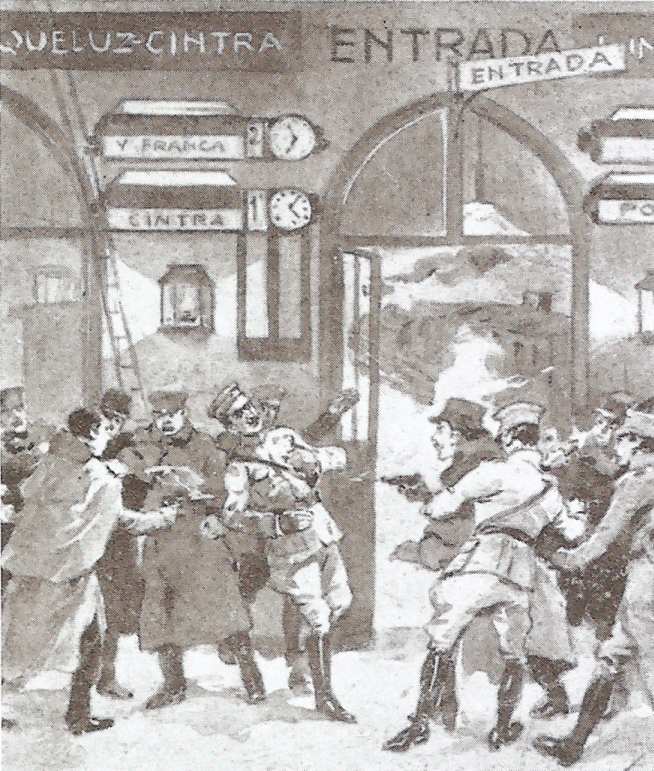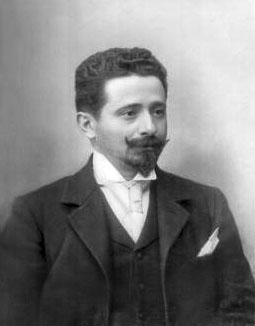|
Portuguese General Election, 1918
General elections were held in Portugal on 28 April 1918, following a coup by Sidónio Pais in December 1917.Dieter Nohlen & Philip Stöver (2010) ''Elections in Europe: A data handbook'', p1542 The elections were boycotted by the Democratic Party, the Evolutionist Party and the Republican Union, who had won over 90% of the seats in the 1915 elections. Although they included the first direct vote election for the position of President, Pais was the only candidate and the vote was uncontested.Nohlen & Stöver, p1563 In the parliamentary elections the result was a victory for the National Republican Party, which won 108 of the 155 seats in the House of Representatives and 32 of the 73 seats in the indirectly elected Senate. Results President Parliament Aftermath Pais was assassinated in Lisbon on 14 December. On 16 December João do Canto e Castro João do Canto e Castro da Silva Antunes (19 May 1862, in Lisbon – 14 March 1934, in Lisbon), commonly known simply as ... [...More Info...] [...Related Items...] OR: [Wikipedia] [Google] [Baidu] |
Sidónio Pais
Sidónio Bernardino Cardoso da Silva Pais (; 1 May 1872 – 14 December 1918) was a Portuguese politician, military officer, and diplomat, who served as the fourth president of the First Portuguese Republic in 1918. One of the most divisive figures in modern Portuguese history, he was referred to by the writer Fernando Pessoa as the "President-King", a description that stuck in later years and symbolizes his regime.Fernando Pessoa (1918). "À memoria do Presidente-Rei Sidónio Pais". Quoted in Darlene Joy Sadler (1998), ''An Introduction to Fernando Pessoa: Modernism and the Paradoxes of Authorship''. Gainesville etc.: University of Florida Press, p. 45. Early life Pais was born in Caminha, 1 May 1872, the eldest child of Sidónio Alberto Marrocos Pais, a notary of Jewish descent, and Rita Júlia Cardoso da Silva, both natives of Caminha. He completed his primary education in Sertã, where he lived between the ages of 7 and 11, and completed his secondary education at th ... [...More Info...] [...Related Items...] OR: [Wikipedia] [Google] [Baidu] |
Evolutionist Party
The Republican Evolutionist Party ( pt, Partido Republicano Evolucionista, PRE), commonly known as the Evolutionist Party, was a political party in Portugal led by António José de Almeida. History The party was established on 24 February 1912 as the result of a split in the Portuguese Republican Party that led to the creation of the PRE, the Democratic Party and the Republican Union.Dieter Nohlen & Philip Stöver (2010) ''Elections in Europe: A data handbook'', p1548 It won 26 seats in the House of Representatives and nine seats in the Senate in the 1915 parliamentary elections, emerging as the second-largest faction after the Democratic Party. The party boycotted the 1918 elections,Nohlen & Stöver, p1557 but returned to run in the 1919 elections, in which it won 38 House seats, regaining its place as the second-largest party. After Almeida became president President most commonly refers to: *President (corporate title) *President (education), a leader of a college or ... [...More Info...] [...Related Items...] OR: [Wikipedia] [Google] [Baidu] |
1918 Elections In Europe
This year is noted for the end of the World War I, First World War, on the eleventh hour of the eleventh day of the eleventh month, as well as for the Spanish flu pandemic that killed 50–100 million people worldwide. Events Below, the events of World War I have the "WWI" prefix. January * January – 1918 flu pandemic: The "Spanish flu" (influenza) is first observed in Haskell County, Kansas. * January 4 – The Finnish Declaration of Independence is recognized by Russian Soviet Federative Socialist Republic, Soviet Russia, Sweden, German Empire, Germany and France. * January 9 – Battle of Bear Valley: U.S. troops engage Yaqui people, Yaqui Native American warriors in a minor skirmish in Arizona, and one of the last battles of the American Indian Wars between the United States and Native Americans. * January 15 ** The keel of is laid in Britain, the first purpose-designed aircraft carrier to be laid down. ** The Red Army (The Workers and Peasants Red Army) ... [...More Info...] [...Related Items...] OR: [Wikipedia] [Google] [Baidu] |
João Do Canto E Castro
João do Canto e Castro da Silva Antunes (19 May 1862, in Lisbon – 14 March 1934, in Lisbon), commonly known simply as João do Canto e Castro was a Portuguese Navy officer and the fifth president of Portugal during the First Portuguese Republic. He also briefly served as 67th prime minister of Portugal. Early life He was the son of General José Ricardo da Costa da Silva Antunes (Lisbon, 7 February 1831 – 7 August 1906) and wife (m. 1860) Maria da Conceição do Canto e Castro Mascarenhas Valdez (24 October 1825 – Lisbon, 20 April 1892). In 1891 he married Mariana de Santo António Moreira Freire Correia Manoel Torres de Aboim (Lisbon, 13 June 1865 – 18 January 1946), sister of the 1st Viscount da Idanha and niece of the 1st Viscount de Vila Boim, and had issue. Career He occupied the post of Navy Minister, to which he had been appointed by Sidónio Pais, the "''President-King''" on 9 September 1918, and succeeded Pais after his murder on 14 December 1918. During hi ... [...More Info...] [...Related Items...] OR: [Wikipedia] [Google] [Baidu] |
Lisbon
Lisbon (; pt, Lisboa ) is the capital and largest city of Portugal, with an estimated population of 544,851 within its administrative limits in an area of 100.05 km2. Grande Lisboa, Lisbon's urban area extends beyond the city's administrative limits with a population of around 2.7 million people, being the List of urban areas of the European Union, 11th-most populous urban area in the European Union.Demographia: World Urban Areas - demographia.com, 06.2021 About 3 million people live in the Lisbon metropolitan area, making it the third largest metropolitan area in the Iberian Peninsula, after Madrid and Barcelona. It represents approximately 27% of the country's population. [...More Info...] [...Related Items...] OR: [Wikipedia] [Google] [Baidu] |
1915 Portuguese Legislative Election
Parliamentary elections were held in Portugal on 13 June 1915.Dieter Nohlen & Philip Stöver (2010) ''Elections in Europe: A data handbook'', p1541 The result was a victory for the Democratic Party, which won 106 of the 163 seats in the Chamber of Deputies and 45 of the 69 seats in the Senate A senate is a deliberative assembly, often the upper house or chamber of a bicameral legislature. The name comes from the ancient Roman Senate (Latin: ''Senatus''), so-called as an assembly of the senior (Latin: ''senex'' meaning "the el ....Nohlen & Stöver, pp1557-1558 Results Notes References {{Portuguese elections Legislative elections in Portugal 1915 elections in Europe 1915 elections in Portugal June 1915 events ... [...More Info...] [...Related Items...] OR: [Wikipedia] [Google] [Baidu] |
Republican Union (Portugal)
The Republican Union Party ( pt, Partido da União Republicana, PUR), commonly known as the Republican Union or the Unionist Party, was a political party in Portugal. History The party was established on 24 February 1912 as the result of a split in the National Republican Union (UNR), with one faction breaking away to form the Evolutionist Party and the rump of the UNR becoming the Republican Union.Dieter Nohlen Dieter Nohlen (born 6 November 1939) is a German academic and political scientist. He currently holds the position of Emeritus Professor of Political Science in the Faculty of Economic and Social Sciences of the University of Heidelberg. An expe ... & Philip Stöver (2010) ''Elections in Europe: A data handbook'', p1548 It won 15 seats in the House of Representatives and 11 seats in the Senate in the 1915 parliamentary elections, emerging as the third-largest faction after the Democratic Party. The party boycotted the 1918 elections,Nohlen & Stöver, p1557 but retur ... [...More Info...] [...Related Items...] OR: [Wikipedia] [Google] [Baidu] |
Democratic Party (Portugal)
The Democratic Party (, ), officially known as the Portuguese Republican Party ( ), was a Portugal, Portuguese centre-left political party during the Portuguese First Republic. It was also the self-proclaimed successor to the original Portuguese Republican Party, which had been behind the 5 October 1910 revolution, revolution that established the Portuguese First Republic in 1910. The name "Democratic Party" was never the official name of the party, as the Portuguese Republican Party never ceased to exist. However, the party was ''de facto'' different and thus the other parties (that belonged to the PRP before 1910) used the new expression to assert their opposition to the claim of continuation of the PRP by Afonso Costa, the first leader of the Democratic Party. Other names were given to the members of the Democratic Party, like the Afonsists, named after Afonso Costa. History When the Evolutionist Party, Evolutionists and Republican Union (Portugal), Unionists seceded from th ... [...More Info...] [...Related Items...] OR: [Wikipedia] [Google] [Baidu] |
National Republican Party (Portugal)
The National Republican Party ( pt, Partido Nacional Republicano, PNR), unofficially known as the Sidonist Party (''Partido Sidonista'') after its leader Sidónio Pais, was a political party in Portugal. History The party was established in April 1918 in order to contest the general elections later that month. Pais was the only candidate for president, and was elected unopposed, whilst the PNR won 108 of the 155 seats in the House of Representatives and 32 of the 73 Senate seats. However, the elections were boycotted by the Democratic Party, the Evolutionist Party and the Republican Union, which had won all but 16 of the seats in the 1915 elections.Dieter Nohlen & Philip Stöver (2010) ''Elections in Europe: A data handbook'', pp1557–1558 After Pais was assassinated later in December 1918, the party went into decline, and merged with the Republican Liberal Party and the Reconstitution Party The Republican Party of National Reconstitution ( pt, Partido Republicano da Reco ... [...More Info...] [...Related Items...] OR: [Wikipedia] [Google] [Baidu] |
Dieter Nohlen
Dieter Nohlen (born 6 November 1939) is a German academic and political scientist. He currently holds the position of Emeritus Professor of Political Science in the Faculty of Economic and Social Sciences of the University of Heidelberg. An expert on electoral system An electoral system or voting system is a set of rules that determine how elections and referendums are conducted and how their results are determined. Electoral systems are used in politics to elect governments, while non-political elections ma ...s and political development, he has published several books. IDEA Bibliography Books published by Nohlen include: *''Electoral systems of the world'' (in German, 1978) *''Lexicon of politics'' (seven volumes) *''Elections and Electoral Systems'' (1996) *''Electi ...[...More Info...] [...Related Items...] OR: [Wikipedia] [Google] [Baidu] |
Portugal
Portugal, officially the Portuguese Republic ( pt, República Portuguesa, links=yes ), is a country whose mainland is located on the Iberian Peninsula of Southwestern Europe, and whose territory also includes the Atlantic archipelagos of the Azores and Madeira. It features the westernmost point in continental Europe, and its Iberian portion is bordered to the west and south by the Atlantic Ocean and to the north and east by Spain, the sole country to have a land border with Portugal. Its two archipelagos form two autonomous regions with their own regional governments. Lisbon is the capital and largest city by population. Portugal is the oldest continuously existing nation state on the Iberian Peninsula and one of the oldest in Europe, its territory having been continuously settled, invaded and fought over since prehistoric times. It was inhabited by pre-Celtic and Celtic peoples who had contact with Phoenicians and Ancient Greek traders, it was ruled by the Ro ... [...More Info...] [...Related Items...] OR: [Wikipedia] [Google] [Baidu] |




